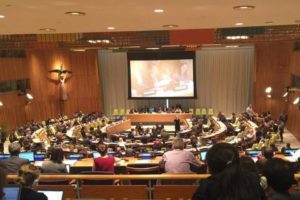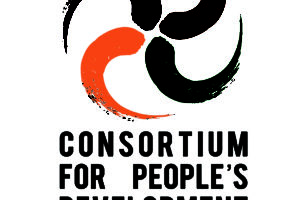[[{“type”:”media”,”view_mode”:”media_original”,”fid”:”2005″,”attributes”:{“alt”:””,”class”:”media-image”,”height”:”430″,”style”:”width: 600px; height: 269px;”,”typeof”:”foaf:Image”,”width”:”960″}}]]Photo: A call to "junk" the CPTPP during the 2018 International Working Women's Day mobilisation in Manila, Philippines
IBON International Statement on the signing of the CPTPP
8 March 2018
Working women and other toiling peoples were greeted by an affront to their rights with the signing of the Comprehensive and Progressive Transpacific Partnership (CPTPP) in Chile. This was held on the same date as International Working Women’s Day.
The misleadingly named “comprehensive” and “progressive” TPP was signed among 11 state parties.[i] Once led by the United States, Japan – a US ally – took on the leadership role in the negotiations. The fast-tracking of the CPTPP is important for regional powers at a time when China leads another “free trade” agreement, and is a rising power.
The US-led TPP meant to strengthen neo-colonial relations between the big power and the Southern states, while robbing working men and women of their rights. The CPTPP remains to be an act of robbery on people’s economic rights by the original agreement’s accomplices.
For IBON International, the agreement’s blanket adherence to “open markets” to supposedly reduce poverty is absurd. More and more reports are released about the widening economic gaps created by decades of neoliberal globalisation.
Blind belief on this doctrine will merely entrench the dominance of corporate monopolies and transnational corporations (TNCs) today. These TNCs and “investors” have worsened the already grave situation of the working sectors in society, plundering resources at the expense of indigenous peoples, gaining profits from privatised hospitals and transport infrastructure, and exploiting workers with race-to-bottom wages.
The CPTPP chapter on development, with its appeals to women and economic growth, is meaningless unless the system breaks free from neoliberal foundations that led to wider inequalities. Worse, many Investor-State Dispute Settlement (ISDS) provisions were retained, and would still protect corporate revenues while neglecting people’s voices against TNCs’ violation of people’s rights.
Michelle Bachelet of Chile is mistaken that the CPTPP would benefit the people or development. Its signing under her watch is against the legacy of development then pushed by Salvador Allende, who belonged to the same party as Bachelet today.
In the global South, smallholder farmers, indigenous peoples, as well as workers, are firm in their fight for peoples’ rights not only for public services such as healthcare but for land, ancestral domains and self-determination, and for work that is not built on exploitation.
Working people from the Southern CPTPP parties must oppose “free trade” agreements that trample on these rights. They have the important role in reclaiming autonomy and space in policy. The poor and marginalised, especially women, would only be truly empowered in a people-centred development and economic democracy at home, and in a trade system built on genuine solidarity and mutual benefit among countries and peoples.
No to CPTPP! No to FTAs! Resist the neo-liberal trade regime!
[i]Australia, Brunei Darussalam, Canada, Chile, Japan, Malaysia, Mexico, New Zealand, Peru, Singapore, and Vietnam




